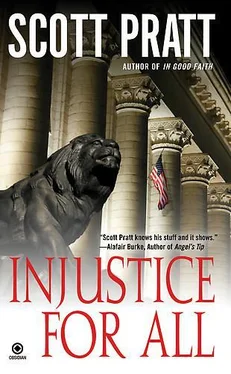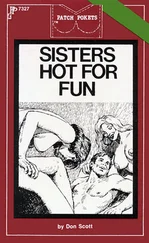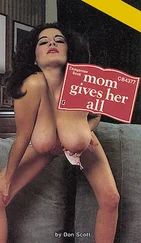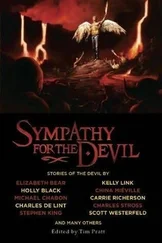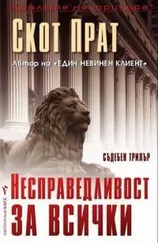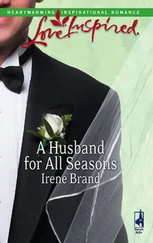Scott Pratt - Injustice for all
Здесь есть возможность читать онлайн «Scott Pratt - Injustice for all» весь текст электронной книги совершенно бесплатно (целиком полную версию без сокращений). В некоторых случаях можно слушать аудио, скачать через торрент в формате fb2 и присутствует краткое содержание. Жанр: Криминальный детектив, на английском языке. Описание произведения, (предисловие) а так же отзывы посетителей доступны на портале библиотеки ЛибКат.
- Название:Injustice for all
- Автор:
- Жанр:
- Год:неизвестен
- ISBN:нет данных
- Рейтинг книги:4 / 5. Голосов: 1
-
Избранное:Добавить в избранное
- Отзывы:
-
Ваша оценка:
- 80
- 1
- 2
- 3
- 4
- 5
Injustice for all: краткое содержание, описание и аннотация
Предлагаем к чтению аннотацию, описание, краткое содержание или предисловие (зависит от того, что написал сам автор книги «Injustice for all»). Если вы не нашли необходимую информацию о книге — напишите в комментариях, мы постараемся отыскать её.
Injustice for all — читать онлайн бесплатно полную книгу (весь текст) целиком
Ниже представлен текст книги, разбитый по страницам. Система сохранения места последней прочитанной страницы, позволяет с удобством читать онлайн бесплатно книгу «Injustice for all», без необходимости каждый раз заново искать на чём Вы остановились. Поставьте закладку, и сможете в любой момент перейти на страницу, на которой закончили чтение.
Интервал:
Закладка:
Aunt Mary arrived home shortly after noon and, after feeding Luke, gave Katie a tour of the outer edges of the property. Every time Katie looked at her, she saw Mother. She was there in Aunt Mary’s mannerisms, in her way of speaking, in the way she moved. The thought crossed Katie’s mind that had Aunt Mary not been such a kind and gentle person, her similarities to Mother would have been painful.
The property was beautiful-twenty-five acres of rolling pasture and five more of wooded land that bordered the national forest. The stream dissected the property from the northeast to the southwest, and the mountains rose like great sentinels all around.
“They’re spectacular, aren’t they?” Aunt Mary said when she noticed Katie staring up at the peak of Mount LeConte. They were rattling along through the pasture in an old green pickup truck that Aunt Mary had backed out of the barn.
“Yes, ma’am,” Katie said.
“But they can be dangerous, too. You have to respect the mountains, Katie.”
“Yes, ma’am.”
As they topped a small ridge heading back toward the house, Katie noticed movement to her left. She looked toward a logging road that led back into the heavy woods and the mountains and saw a line of trucks heading down toward Roaring Fork Road. She counted ten of them, large trucks like those that carried soldiers in the movies, with huge tires and covered in canvas. At the front of the line was a Jeep with a star on the door and a bar of lights across the top.
“What’s that?” Katie asked, pointing in the direction of the convoy.
Aunt Mary’s face turned cold.
“It’s nothing,” she said. “If you ever see them again, you just act like they’re not even there.”
10
The immediate aftermath of Ray Miller’s public suicide was confusion, followed by the horror of realization. Numbed and silent, I moved slowly across the courtroom floor to where his body lay, and I knelt beside him. Ray had dropped straight to the ground between the prosecution and defense tables, partially on his side, his open eyes staring blankly ahead, his face frozen in a look of eternal defiance. The gun lay at his side, and a dark pool of blood spread slowly on the gray carpet beneath his head.
Judge Green emerged from his hiding place a few moments later. The first bullet had struck his high-backed chair an inch from his right ear; the second had actually caught the sleeve of his robe. But the judge was unscathed, and he soon began muttering to himself as he leaned against the wall and walked stiffly toward his chambers. I noticed that nobody went to Green’s aid, at least not until the emergency medical people showed up. One of the paramedics found him later, sitting on the toilet in his private bathroom, fully clothed, babbling about miracles and the mysteries of life.
The sheriff’s department quickly learned that Ray had managed to get the gun into the courtroom by avoiding the security station. He simply walked in a back door of the courthouse-a door frequently used by attorneys and county government employees-and came up the stairwell past the property assessor’s office. That door is now locked, so that anyone entering the courthouse has to pass through the metal detectors. Too little. Too late.
The medical examiner found a note in Ray’s pocket. It was a long and rambling good-bye to Toni and Tommy, but it established a reason, at least in Ray’s mind, for his suicide. He believed the two million dollars in insurance money his wife would collect would take care of his family far better than he could. Toni told Caroline that Ray had owned the policy for ten years, so the two-year suicide clause standard in life insurance contracts had long expired. Toni has become an instant millionaire, but I know she would gladly trade every dime for an opportunity to turn back the clock and save her husband.
I’m standing now at the back of a hearse in the immaculate burial ground at the Veterans Administration at Mountain Home. It’s two o’clock on Sunday afternoon, and dozens of people are milling around beneath an overcast sky. A brown canopy has been erected over Ray’s grave. I’m one of eight pallbearers. Jack has driven up from Nashville and is standing next to me, and across from him stands Tommy Miller. Tommy, tall and lean and dark haired, has adopted the affect of a zombie. I haven’t heard him utter a single word since we arrived. His cheeks are without color, his dark eyes empty and trained on the ground.
The group of pallbearers stands silently as the funeral home director slides Ray’s casket out of the hearse. We carry the flag-draped casket solemnly through the crowd toward the tent. As we place the casket on the stand above Ray’s grave, I hear Toni sobbing behind the black veil she’s wearing. Jack and I step out of the tent and stand next to Caroline and Lilly. Caroline is sniffling into a pink handkerchief.
“This is terrible,” she whispers. “So senseless.”
A debate has been raging in the legal community over the past few days. Who’s to blame for Ray Miller’s killing himself has been the central question. Many blame Ray, reasoning that his aggressive style in the courtroom and his bravado with judges made him an inevitable target for someone like Judge Green. Had he kept his head down, played nice, and got along like nearly everyone else, he wouldn’t have found himself in such a desperate situation. It’s as though they believe he got what he deserved.
Others, of course, blame the judge. There’s little doubt that his vicious campaign against Ray was personally motivated and largely unfounded. Nearly everyone believes that had any other lawyer made the same mistake Ray made, nobody outside of the judge’s office would have heard about it. But Ray had been suspended, jailed, and bankrupted. The local media sharks had gone on a feeding frenzy, and Ray was the bait fish of the month. His reputation had been shattered.
Then there are those who call Ray a coward. He didn’t have to kill himself, they say. He could have taken his medicine, apologized to the judge, gone through a bar hearing, and he would have been back practicing law within a year. I find myself empathizing with Ray on that point. I’m a proud man, just as he was. If a judge had taken away my ability to earn a living and care for my family and the media had ruined my reputation without giving me a chance to defend myself, I might have considered doing the same thing Ray did. The only difference, I think, is that I wouldn’t have missed when I fired the shots at the judge.
A minister is talking, saying something nonsensical about a basket representing Ray’s life and that he had filled his basket to overflowing with love for his family and friends, service for his clients, and genuine feeling for his fellow man. He’s speaking in banal generalities. It’s obvious the minister didn’t know Ray.
“Follow his example,” the preacher says. “Fill your basket.”
He drones on about how we shouldn’t judge Ray for taking his own life, that God never gives us more than we can handle, and that the bullet that ended Ray’s life was somehow an instrument of God’s love. It’s sophistry of the worst kind, worthy of an appellate court, and I find myself wanting to tell the preacher to shut up and let us bury Ray with some dignity.
But I stand there quietly, grieving for my friend but grateful I’m still alive, still with the people I love, and once again I think about how fleeting life is, how fragile, how dangerously unstable. One minute Ray Miller was a fine specimen of a man, a strong and brave spirit standing defiantly in front of those who sought to persecute him, and the next he was a mass of dead matter, lying in a heap on the ground, his spirit gone to some mysterious place.
Читать дальшеИнтервал:
Закладка:
Похожие книги на «Injustice for all»
Представляем Вашему вниманию похожие книги на «Injustice for all» списком для выбора. Мы отобрали схожую по названию и смыслу литературу в надежде предоставить читателям больше вариантов отыскать новые, интересные, ещё непрочитанные произведения.
Обсуждение, отзывы о книге «Injustice for all» и просто собственные мнения читателей. Оставьте ваши комментарии, напишите, что Вы думаете о произведении, его смысле или главных героях. Укажите что конкретно понравилось, а что нет, и почему Вы так считаете.
